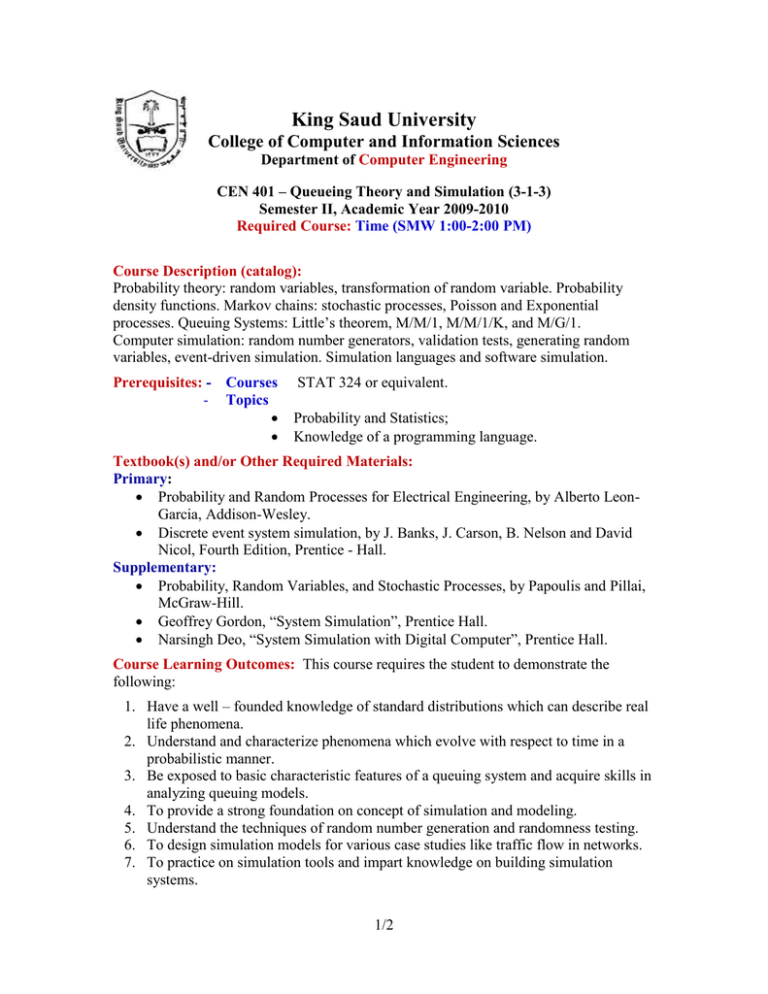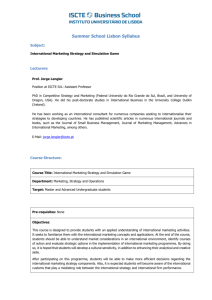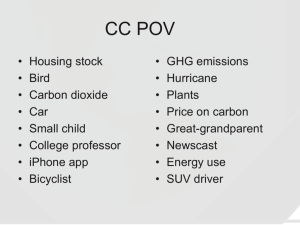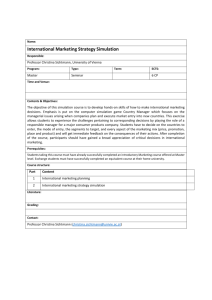CEN 401: Queueing theory and simulation
advertisement

King Saud University College of Computer and Information Sciences Department of Computer Engineering CEN 401 – Queueing Theory and Simulation (3-1-3) Semester II, Academic Year 2009-2010 Required Course: Time (SMW 1:00-2:00 PM) Course Description (catalog): Probability theory: random variables, transformation of random variable. Probability density functions. Markov chains: stochastic processes, Poisson and Exponential processes. Queuing Systems: Little’s theorem, M/M/1, M/M/1/K, and M/G/1. Computer simulation: random number generators, validation tests, generating random variables, event-driven simulation. Simulation languages and software simulation. Prerequisites: - Courses - Topics STAT 324 or equivalent. Probability and Statistics; Knowledge of a programming language. Textbook(s) and/or Other Required Materials: Primary: Probability and Random Processes for Electrical Engineering, by Alberto LeonGarcia, Addison-Wesley. Discrete event system simulation, by J. Banks, J. Carson, B. Nelson and David Nicol, Fourth Edition, Prentice - Hall. Supplementary: Probability, Random Variables, and Stochastic Processes, by Papoulis and Pillai, McGraw-Hill. Geoffrey Gordon, “System Simulation”, Prentice Hall. Narsingh Deo, “System Simulation with Digital Computer”, Prentice Hall. Course Learning Outcomes: This course requires the student to demonstrate the following: 1. Have a well – founded knowledge of standard distributions which can describe real life phenomena. 2. Understand and characterize phenomena which evolve with respect to time in a probabilistic manner. 3. Be exposed to basic characteristic features of a queuing system and acquire skills in analyzing queuing models. 4. To provide a strong foundation on concept of simulation and modeling. 5. Understand the techniques of random number generation and randomness testing. 6. To design simulation models for various case studies like traffic flow in networks. 7. To practice on simulation tools and impart knowledge on building simulation systems. 1/2 Major Topics covered and schedule in weeks: Topic Weeks 1 Probability theory: random variables, transformation of random variable. 1 Probability density functions. 1.5 Stochastic processes: Poisson and Exponential processes. 1.5 Stationary Processes: Birth-death processes, Markov Chains. 2 Queuing Systems: Little’s theorem, M/M/1, M/M/k, M/M/∞, M/M/1/k. 1 M/G/1: Pollaczek – Khintchine formula. 1 Random number generators, validation tests. 1 Generating random variates. 1 Input modelling. 2 Event-driven simulation: simulation of M/M/1 queue. 1 Simulation languages. Assessment Plan for the Course Students’ performance in homework, quizzes, exams, and class-projects Contribution of Course to Meeting Curriculum Disciplines: Curriculum Discipline Percentage Mathematics and Basic Science 60 Engineering Science 10 Engineering Design 30 General Education Relationship of Course to Program Outcomes Outcome Program Outcome Description Level of Contribution (a) (b) an ability to apply knowledge of mathematics, science, and engineering an ability to design and conduct experiments, as well as to analyze and interpret data (c) an ability to design a system, component, or process to meet desired needs within realistic constraints such as economic, environmental, social, political, ethical, health and safety, manufacturability, and sustainability (d) an ability to function on multidisciplinary teams (e) an ability to identify, formulate, and solve engineering problems (f) an understanding of professional and ethical responsibility (g) an ability to communicate effectively (h) the broad education necessary to understand the impact of engineering solutions in a global, economic, environmental, and societal context (i) a recognition of the need for, and an ability to engage in life-long learning (j) a knowledge of contemporary issues (k) an ability to use the techniques, skills, and modern engineering tools necessary for engineering practice. H=High, M= Medium, L=Low Prepared by: Dr Nasser-Eddine Rikli. 2/2





